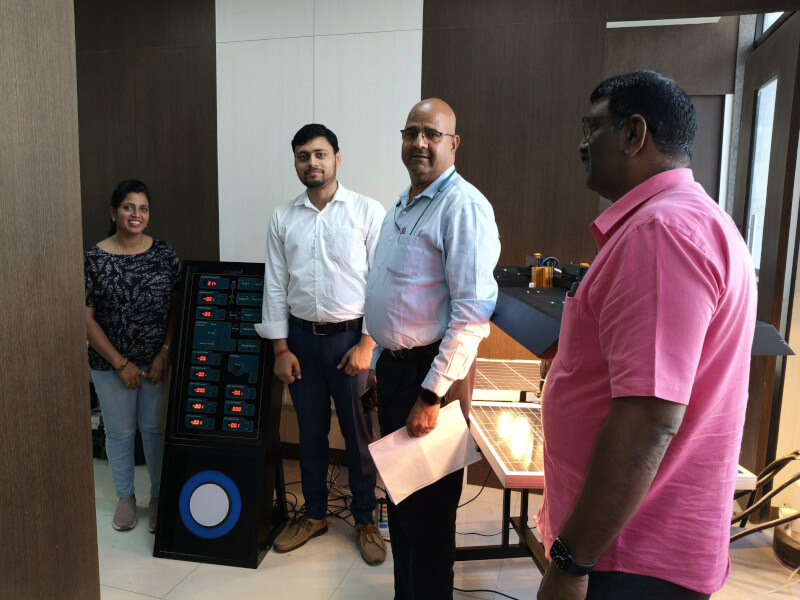Ecosense has successfully installed its Solar PV Training and Research System at the Centre for Energy Studies, Savitribai Phule Pune University. As a leading institution in renewable energy research and education, SPPU continues to foster innovation, industry collaboration, and hands-on learning in sustainable energy technologies.
Empowering Research & Education in Solar Energy
The Solar PV Training and Research System provides an advanced platform for students, researchers, and faculty to explore the fundamentals and advanced concepts of solar photovoltaic (PV) technology. The system is designed to offer practical, research-driven insights into solar power generation, performance optimization, and system integration.
The system covers three core areas of solar PV technology. The first focuses on the physics and performance of solar panels, including I-V and P-V characteristics, the effects of irradiation, temperature, shading, and tilt angle, as well as the impact of geographic location on energy output. The second area involves understanding the components and integration of a standalone solar PV system, including charge controllers, inverters, blocking and bypass diodes, AC/DC loads, and MPPT vs. PWM charge controllers, along with power flow analysis across various components. The third aspect facilitates advanced research in PV systems, particularly in maximum power point tracking (MPPT), allowing users to test custom MPPT algorithms and manually control gate signals for charge controllers.
Technical Features of the Solar PV Training and Research System
This state-of-the-art system is equipped with an active measurement panel for precise monitoring of voltages, currents, and temperature. It allows users to adjust irradiation levels to simulate varying sunlight conditions, affecting solar panel temperature and performance. The system also enables flexible solar panel configurations in series and parallel, incorporates an adjustable tilt mechanism to study the impact of angle on PV efficiency, and includes shading simulation tools to analyze the effects of partial shading on energy production.
Designed for hands-on learning, the system provides an open configuration where users can practice assembling and connecting different components to install a standalone solar PV power plant. It also facilitates power flow calculations for charge controllers, inverters, and battery storage. The system supports external MPPT signal input, allowing researchers to study the effects of different MPPT algorithms on energy conversion efficiency. A proprietary PC software enables real-time data visualization, plotting of various performance curves, and CSV data storage for analysis and record-keeping. The system is further equipped with advanced instrumentation, including solar insolation meters and angle measurement tools, ensuring precise experimentation and data collection.
Training Program for Faculty & Researchers
To maximize the benefits of this installation, Ecosense conducted a detailed demonstration program for faculty members, researchers, and scholars at Centre for Energy Studies. The session covered the fundamentals and advanced concepts of solar PV technology, hands-on demonstrations of system operation, software-based real-time data analysis, and methodologies for MPPT research and algorithm implementation. By equipping faculty and researchers with in-depth technical knowledge, the training program ensures that students receive high-quality, practical education in solar energy systems.

Ecosense Installs Solar PV Training and Research System at Centre for Energy Studies, Savitribai Phule Pune University
A Commitment to Sustainable Energy Innovation
With this installation, Savitribai Phule Pune University strengthens its position as a leader in renewable energy education and research. The Solar PV Training and Research System will serve as a vital resource for students and scholars, enabling them to develop expertise in solar energy technologies and contribute to India’s transition to a clean and sustainable energy future. Ecosense remains committed to advancing renewable energy education and looks forward to supporting further research and innovation in academic institutions.
